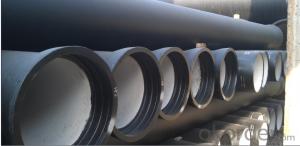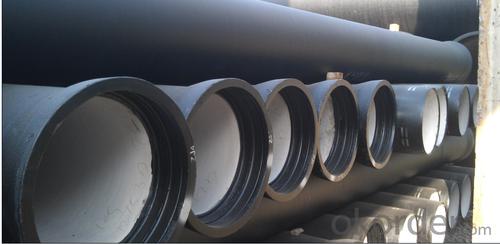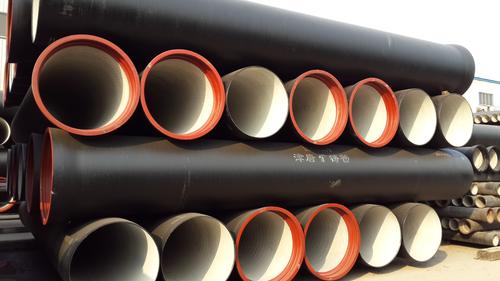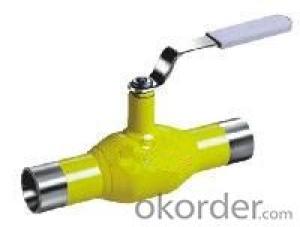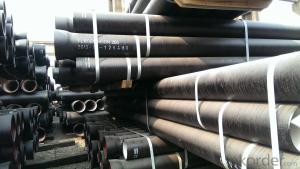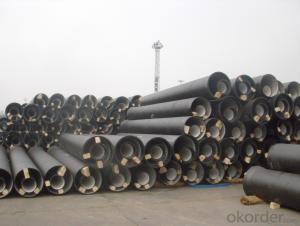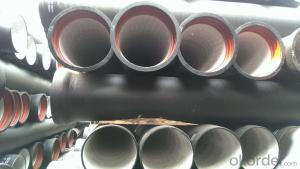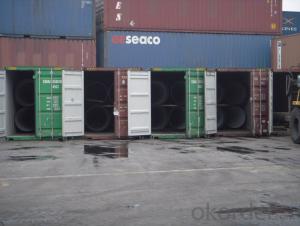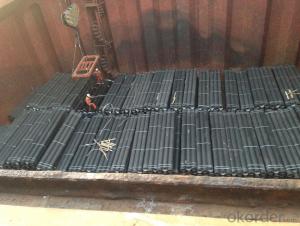DUCTILE IRON PIPE K12 DN 1000 SOCKET SPIGOT PIPE
- Loading Port:
- Tianjin
- Payment Terms:
- TT OR LC
- Min Order Qty:
- 10 m.t.
- Supply Capability:
- 30000 m.t./month
OKorder Service Pledge
OKorder Financial Service
You Might Also Like
1) The standard of pipe: ISO2531:1998, EN545:2006,K9 K8
2) Effective length: 6m/5.7m
3) Inner cement line: Portland cement lineas per ISO4179
4) Zinc coating: at least 130g/m2 as per ISO8179
5) Bitumen painting: at least 70μm as per ISO8179
6)With 102% quantity of NBR, SBR, or EPDM ring asper ISO4633
7) DN80-DN1200
8) Highstrength, lighter than grey iron, good corrosion resistance, no furring, smallflow resistance, easy fixing, long life tome about 100 yeas
9)Checked by automatic inspection equipment
10) Composition:
Chemical composition | |||
Chemical composition | Ductile Cast Iron Pipe (%) | Grey iron pipe (%) | Steel pipe (%) |
C | 3.5-4.0 | 3.2-3.8 | 0.1-0.2 |
Si | 1.9-2.6 | 1.4-2.2 | 0.15-0.4 |
Mn | 0.15-0.45 | 0.4-0.6 | 0.3-0.6 |
P | ≤0.06 | ≤0.3 | 0.02-0.03 |
S | ≤0.02 | ≤0.1 | 0.02-0.03 |
Mg | 0.03-0.06 |
|
|
11) Feature:
Mechanical properties | |||
| Ductile Cast Iron Pipe | Grey Iron Pipe | Steel Pipe |
Tensile Strength(Mpa) | ≥420 | 150-260 | ≥400 |
Yield Strength(Mpa) | ≥300 | No Confirmation | No Confirmation |
Bending Strength(Mpa) | ≥590 | 200-360 | ≥400 |
Elongation (%) | ≥10 | Neglected | ≥18 |
Brinell Hardness(HBS) | ≤230 | ≤230 | About 140 |
12) T type mechanical joint
13) Packing: in bulk or container
PACKING: 1) Pipesare bundled together with the steel belt.
2) Wooden pieces are put between the pipes.
- Q: What are ductile iron pipes?
- Ductile iron pipes, possessing high tensile strength and flexibility, are a variant of iron pipes. They are manufactured by treating cast iron with small quantities of magnesium, resulting in a material that surpasses traditional cast iron pipes in terms of strength and resilience. The introduction of magnesium alters the microstructure of the iron, leading to the formation of graphite nodules within the iron, hence the term "ductile iron". This distinctive structure grants ductile iron pipes exceptional properties, enabling them to withstand high pressures and extreme temperatures without cracking or breaking. Consequently, ductile iron pipes are commonly employed in water and wastewater systems, as well as various industrial applications, due to their durability, longevity, and capacity to endure external loads. Moreover, their ease of installation and minimal maintenance requirements have made them a favored choice in the construction industry.
- Q: Can ductile iron pipe be used for bridge crossings?
- Yes, ductile iron pipe can be used for bridge crossings. Ductile iron pipe is known for its strength, durability, and flexibility, making it suitable for various applications, including bridge crossings. Its high tensile strength allows it to withstand heavy loads and vibrations, making it ideal for supporting bridges and handling the weight of traffic. Additionally, ductile iron pipe's flexibility allows it to absorb movements and deformations caused by temperature changes, settling, and other factors, reducing the risk of structural damage and ensuring the longevity of the bridge crossing. Furthermore, ductile iron pipe is resistant to corrosion, making it a reliable choice for bridge crossings where exposure to moisture, chemicals, and other corrosive elements is common. Overall, ductile iron pipe's properties make it a suitable and reliable material for bridge crossings.
- Q: Are ductile iron pipes suitable for sewer force mains?
- Yes, ductile iron pipes are suitable for sewer force mains. They have proven to be a reliable and durable choice for transporting wastewater under pressure. Their high tensile strength and resistance to corrosion make them ideal for withstanding the demanding conditions of sewer force mains.
- Q: Are ductile iron pipes suitable for gravity flow applications?
- Yes, ductile iron pipes are suitable for gravity flow applications. Ductile iron pipes have high strength and durability, making them ideal for carrying fluids under gravity. They can withstand the pressure and weight of fluid flow without the need for additional support or reinforcement. Additionally, ductile iron pipes have excellent corrosion resistance, which ensures their long-term performance in gravity flow systems.
- Q: What is the cost of ductile iron pipe compared to other pipe materials?
- The cost of ductile iron pipe compared to other pipe materials can vary depending on various factors such as the size, length, and specific requirements of the project. However, generally speaking, ductile iron pipe tends to be more expensive than some of the alternative pipe materials such as PVC or HDPE (high-density polyethylene) pipes. Ductile iron pipe is known for its exceptional strength and durability, making it suitable for a wide range of applications including water distribution, wastewater systems, and industrial piping. Its robustness and longevity contribute to its higher cost compared to other pipe materials. On the other hand, PVC and HDPE pipes are often more affordable options due to their lower production and material costs. Additionally, these materials are lightweight, easy to install, and resistant to corrosion, which can lead to cost savings during installation and maintenance. It is important to note that while ductile iron pipe may have a higher upfront cost, its superior strength and longevity can result in long-term cost savings by minimizing the need for frequent repairs or replacements. The choice of pipe material should be made considering the specific project requirements, budget constraints, and the anticipated lifespan of the infrastructure.
- Q: How can the three pipes of ductile iron leak?
- When the pipe connection of the three water leakage, first of all to see whether it is to do the pipe three links of the manufacturers, pressure did not reach, if it is. It is only the replacement, if not, with cast iron electrode welding, or socket connection half!
- Q: What is the expected hoop stress capacity of ductile iron pipes?
- The capacity for hoop stress expected in ductile iron pipes can vary depending on various factors, including the diameter, wall thickness, and material grade of the pipes. However, as a general rule, ductile iron pipes possess a high level of strength and durability, enabling them to withstand significant levels of hoop stress. Ductile iron pipes are specifically designed and manufactured to meet certain standards and requirements, such as those put forth by the American Water Works Association (AWWA) C151 and C115 standards. These standards ensure that the pipes possess the necessary strength to handle the expected loads and pressures that they will encounter throughout their lifespan. The capacity for hoop stress in ductile iron pipes primarily relies on their tensile strength. Ductile iron is a form of cast iron that has been treated to exhibit ductility, meaning it can withstand tensile stress without fracturing. This characteristic makes it suitable for applications where the pipes may encounter internal or external pressure, such as water distribution systems or sewer lines. Engineers typically perform calculations to determine the anticipated hoop stress capacity of ductile iron pipes. These calculations take into account specific pipe dimensions, material properties, and expected operating conditions. Factors such as internal pressure, external loads, and safety factors required by design standards are considered in these calculations. It is important to verify the expected hoop stress capacity of ductile iron pipes using the manufacturer's specifications and engineering calculations. Furthermore, any modifications or repairs to the pipes should be carried out by qualified professionals following industry guidelines to ensure their ongoing strength and performance.
- Q: What is the content of silicon in silicon molybdenum ductile iron?
- Customers generally give a wide range, most of the national standard "reference" the United States of similar brands suspected. Especially 3.75-4.25% Si too big. We can narrow the scope according to their actual situationHowever, the high Si content of the end we can pregnant before Si% and several birth control adjustment. I personally think that many times easy inoculation, increased nucleation; more than 517 in terms of strength, the lower the content of Mn, some clients request F content in more than 95%, but do not worry about the intensity of the problem, even if the F matrix as long as the components of control will be above 517. Spheroidizer we can choose good quality, spheroidization time have good control over 60S,
- Q: What are the advantages of using ductile iron pipes over other materials?
- There are several advantages of using ductile iron pipes over other materials. Firstly, ductile iron pipes have a high tensile strength, which makes them more resistant to pressure and external forces, reducing the risk of cracks or leaks. Secondly, ductile iron pipes have a longer lifespan compared to other materials, as they are highly durable and resistant to corrosion. Additionally, ductile iron pipes have a smooth internal surface, promoting efficient water flow and minimizing the risk of blockages. Lastly, ductile iron pipes are relatively cost-effective and easy to install, making them a preferred choice for various applications in water distribution, sewer systems, and industrial settings.
- Q: How are ductile iron pipes protected against stray current corrosion?
- Various preventive measures and protective coatings are employed to safeguard ductile iron pipes from stray current corrosion. Stray current corrosion arises when an electric current flows through the pipe, causing accelerated corrosion and potential harm. To prevent this, the following measures are generally utilized: 1. Electrical isolation: Ductile iron pipes are insulated from other metallic structures by means of insulating materials like rubber gaskets or non-conductive coatings. This insulation obstructs the passage of stray current through the pipe, thereby minimizing the risk of corrosion. 2. Cathodic protection: Cathodic protection is a widely employed technique to shield ductile iron pipes from stray current corrosion. It involves installing sacrificial anodes or impressed current systems near the pipe. These anodes or systems emit a controlled electric current that counters the stray current and guarantees the cathodic protection of the iron pipe. 3. Coatings: Ductile iron pipes are typically coated with protective layers to enhance their resistance against corrosion. A common coating is fusion-bonded epoxy (FBE), which offers a high level of protection against stray current corrosion. FBE coatings act as a barrier, preventing electrical contact between the pipe and the surrounding environment. 4. Monitoring and maintenance: Regular monitoring and maintenance are essential for ensuring the ongoing protection of ductile iron pipes against stray current corrosion. This entails inspecting the protective coatings for any damage or deterioration and promptly repairing or replacing them as required. Additionally, monitoring systems can be installed to detect and measure stray currents, allowing for timely intervention if necessary. By implementing these protection measures, ductile iron pipes can effectively ward off stray current corrosion, thereby prolonging their lifespan and ensuring the integrity of the pipeline infrastructure.
Send your message to us
DUCTILE IRON PIPE K12 DN 1000 SOCKET SPIGOT PIPE
- Loading Port:
- Tianjin
- Payment Terms:
- TT OR LC
- Min Order Qty:
- 10 m.t.
- Supply Capability:
- 30000 m.t./month
OKorder Service Pledge
OKorder Financial Service
Similar products
Hot products
Hot Searches
Related keywords
